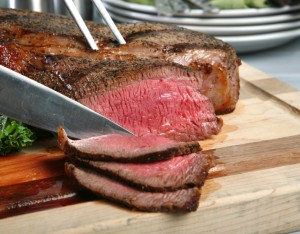The Safe Food Coalition has sent a letter to Agriculture Secretary Tom Vilsack, urging him to finalize the mechanically tenderized beef label and send it to the Office of Management and Budget for final approved. The USDA has delayed finalizing this rule that has been “in process” since 2008.
 Canada has already mandated a label for these products, which are whole cuts of beef, including steaks, pierced with needles or pins to tenderize them. This action forces pathogenic bacteria from the surface of the meat into the interior. If the tenderized beef is not cooked to 160°F, or well done, those bacteria can survive and make someone sick. A 2012 E. coli O157:H7 outbreak linked to XL Foods recalled mechanically tenderized beef in Canada prompted this change in that country.
Canada has already mandated a label for these products, which are whole cuts of beef, including steaks, pierced with needles or pins to tenderize them. This action forces pathogenic bacteria from the surface of the meat into the interior. If the tenderized beef is not cooked to 160°F, or well done, those bacteria can survive and make someone sick. A 2012 E. coli O157:H7 outbreak linked to XL Foods recalled mechanically tenderized beef in Canada prompted this change in that country.
The treated products do not look different from untreated cuts of beef. So consumers do not know that they have purchased beef that can make them sick if not cooked to well done. The Coalition states that these higher risk products need more oversight and more labeling and standards, not less.
USDA’s 2008 Checklist and Reassessment for Control for E. coli O157:H7 in Beef Operations showed many problems with the production of these products. Eighty-eight percent of beef establishments that tenderized beef in this fashion did not use any pathogen-reduction intervention before treatment. And 82% of those facilities did not test the finished product for pathogenic bacteria.
Labeling these products will help reduce illnesses from E. coli O157:H7. In the June 10, 2013 Federal Register Notice, FSIS suggests that 133 to 1,497 E. coli O157:H7 illnesses could be prevented every year by clear label instructions. The average cost of each of these infections is about $3,000 dollars. By adopting this rule, there would be an economic benefit of at least $1.5 million per year in the U.S.
The comment period for the proposed rule was closed on October 8, 2013. It still needs USDA and OMB final approval. If those agencies do not approve the rule before December 13, 2014, implementation will be delayed an additional two years. That means thousands of consumers will get sick when they don’t have to.
The coalition is comprised of Center for Foodborne Illness Research & Prevention, Center for Science in the Public Interest, Consumer Federation of America, Consumers Union, and Food and Water Watch.




